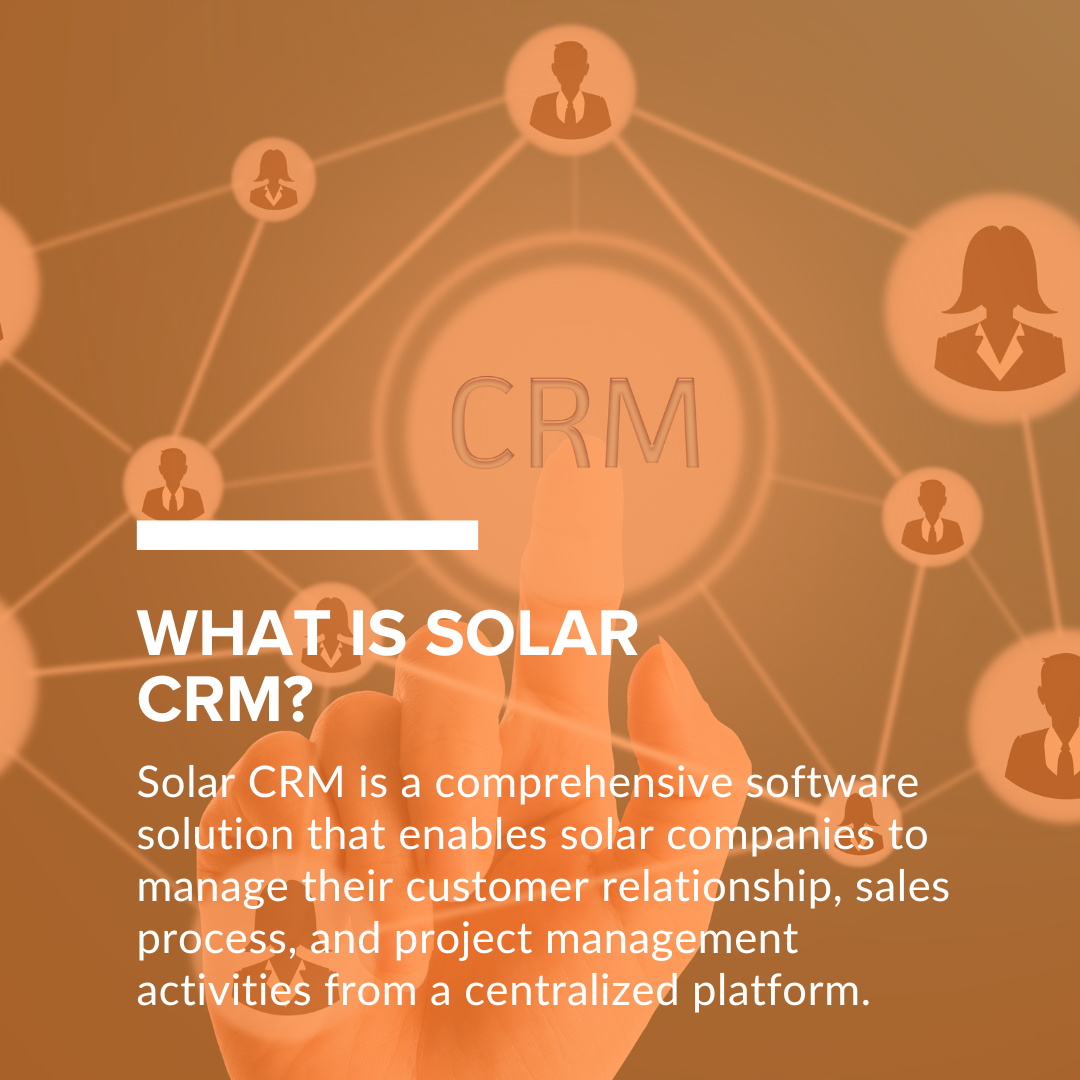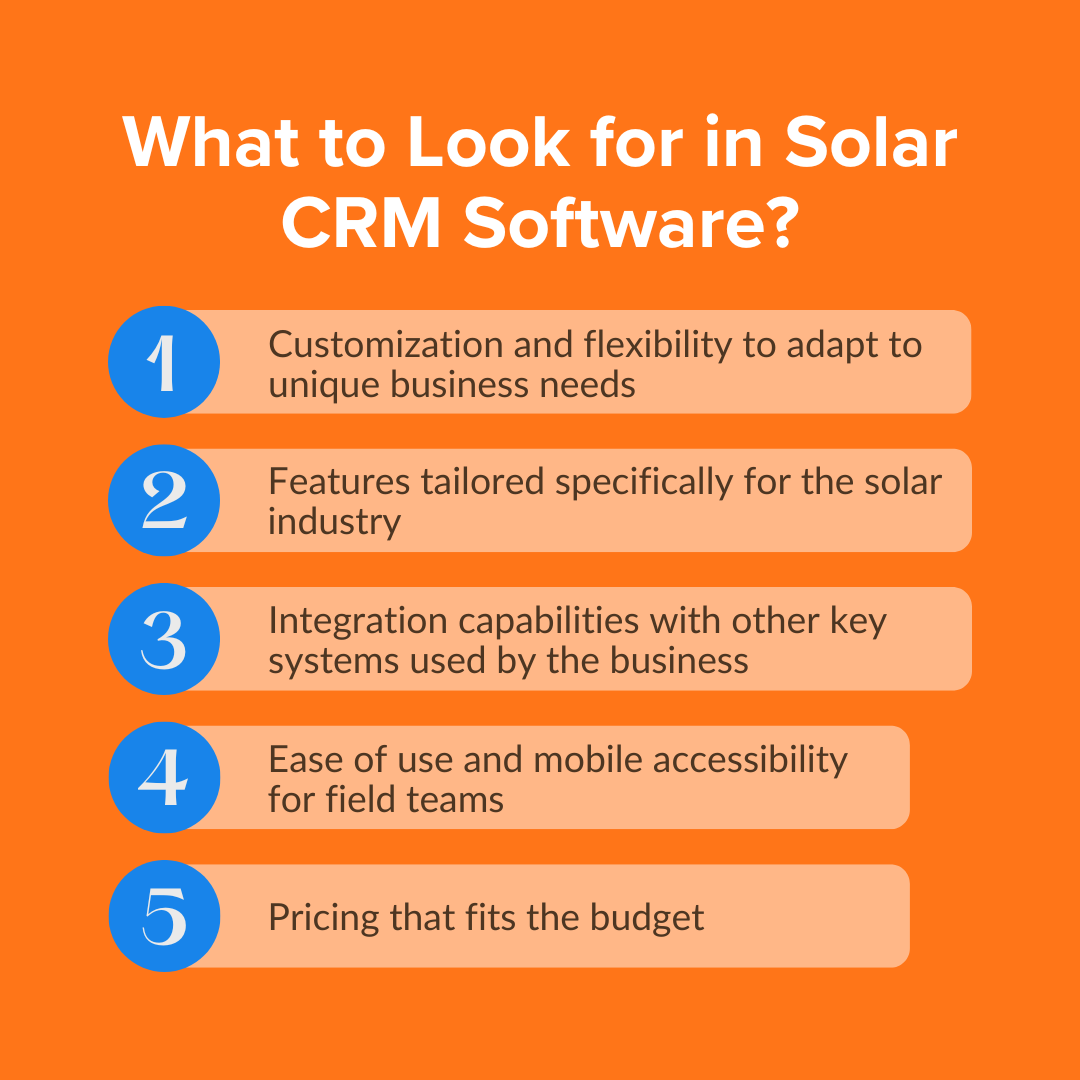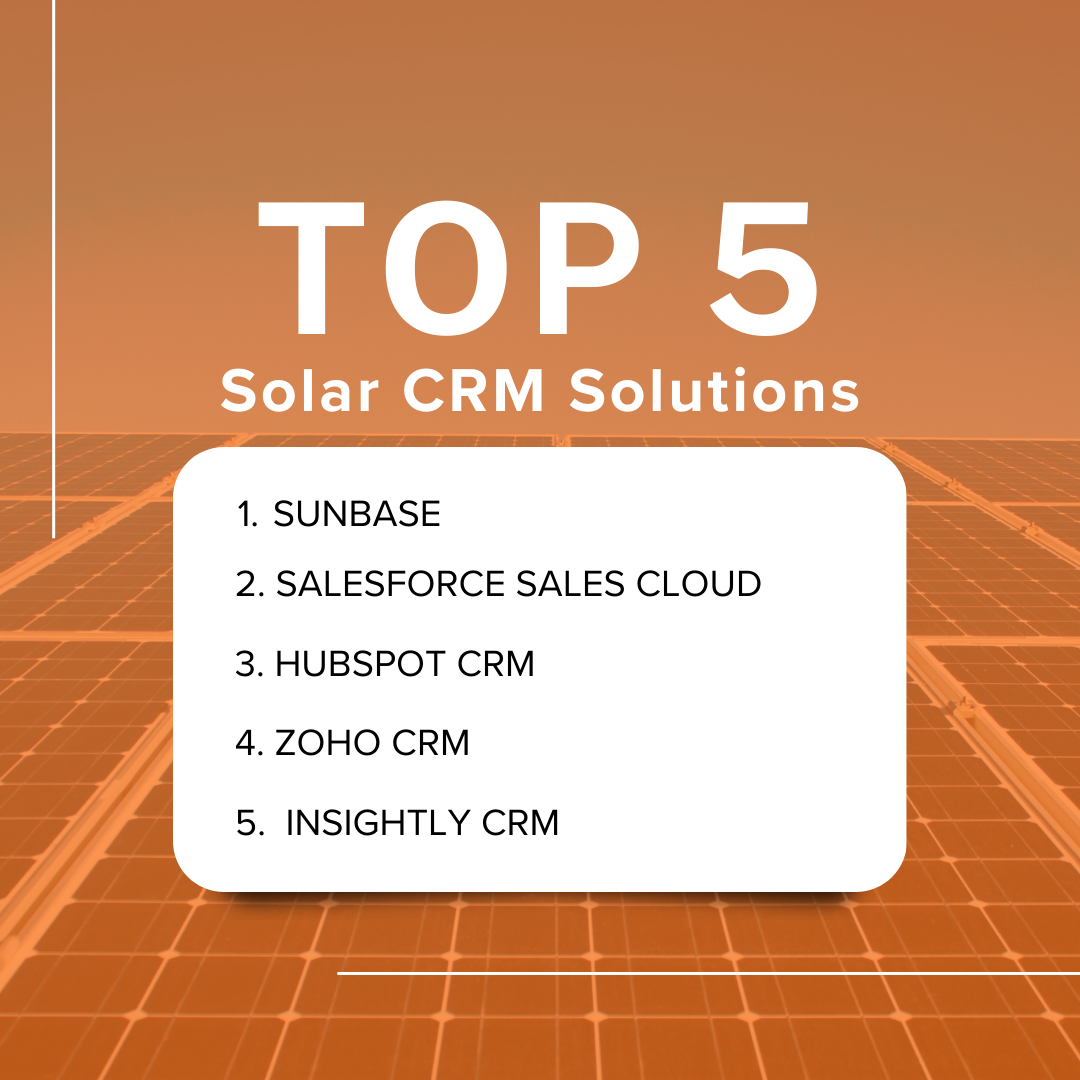September 17, 2024
Standing out from the crowd in the fiercely competitive solar industry isn't just a goal—it's a necessity. And guess what? Managing your customer relationships effectively is the secret sauce to making it happen. These power-packed tools can transform your solar company by streamlining sales and marketing, boosting customer service, and fueling business growth.
Did you know that businesses using CRM systems see an average increase in sales by 29%!
With a plethora of CRM options out there, finding the perfect fit for your solar business can feel like searching for a needle in a haystack. Each CRM comes with its unique blend of features, benefits, and pricing, making the decision-making process a bit overwhelming. But don’t worry, we’ve got you covered!
In this blog, we're diving into the crème de la crème of CRMs designed specifically for solar businesses. We’ll break down their key features, benefits, and affordability to help you find the perfect match for your company. So, let’s get started and find the CRM that will take your solar business to the next level!
What is Solar CRM?

Solar CRM is a comprehensive software solution that enables solar companies to manage their customer relationship, sales process, and project management activities from a centralized platform. Solar CRM allows businesses to gain deeper insights into their customer’s needs and preferences by providing a 360-degree view of customer interactions.
Solar CRM, or Customer Relationship Management software will help you manage customer interactions, sales processes, and project management efficiently, which is crucial for success.
You might want to have a look at: The Future of Solar Sales: Innovations and Trends Shaping the Industry.
What to Look for in Solar CRM Software?
When selecting a Customer Relationship Management (CRM) system for your solar business, it’s essential to choose one that aligns with your specific needs and objectives. Here are key factors to consider:

1. Customization and flexibility to adapt to unique business needs
Tailored Modules and Workflows: A good CRM should allow you to customize modules and workflows to suit your unique business processes. This means you can adapt the system to track specific information relevant to solar projects, such as site surveys, installation progress, and maintenance schedules.
Adaptability: As your business evolves, your CRM should be flexible enough to adapt to new requirements without significant overhauls. This flexibility ensures that the system remains relevant and useful over time.
2. Features tailored specifically for the solar industry
Solar Design Integration: Integration with solar design software is crucial for streamlining the transition from sales to project execution. This feature allows for seamless data flow between design and CRM, reducing errors and improving efficiency.
Utilizing specialized solar software that integrates with your CRM can further streamline operations and improve efficiency.
Installation Tracking: Your CRM should offer tools for tracking the progress of solar installations, from initial planning to final deployment. This includes scheduling, resource allocation, and milestone tracking to ensure projects stay on time and within budget.
Energy Production Monitoring: For solar businesses that offer performance monitoring services, a CRM with built-in or integrated energy production tracking capabilities can provide valuable insights into system performance and customer satisfaction.
3. Integration capabilities with other key systems used by the business
Accounting Software Integration: Ensure the CRM can connect with your accounting software to streamline financial tracking and reporting. This integration helps in automating invoicing, payments, and financial analysis.
Marketing Platforms: Integration with marketing tools allows for seamless management of marketing campaigns, lead nurturing, and customer engagement, ensuring that solar leads are effectively tracked and managed. This capability can help you create targeted marketing efforts based on CRM data.
Project Management Tools: Linking your CRM with project management tools can enhance collaboration and ensure that all project-related information is centralized. This integration facilitates better project tracking, task assignment, and team communication.
4. Ease of use and mobile accessibility for field teams
User-Friendly Interface: A CRM with an intuitive interface reduces the learning curve and increases adoption rates among your team. Look for systems that offer clear navigation, easy data entry, and straightforward reporting tools.
Mobile Access: Field teams are often on the move in the solar industry. A CRM with a robust mobile app ensures that your team can access and update information in real-time, regardless of their location. This capability is vital for maintaining up-to-date records and improving responsiveness for the sales reps, ultimately enhancing solar sales performance.
5. Pricing that fits the budget
Cost-Effectiveness: While evaluating CRM options, consider not only the initial cost but also the total cost of ownership, including maintenance, upgrades, and any hidden fees. The system should provide value for money by offering essential features within your budget constraints.
Transparent Pricing Plans: Look for CRMs that offer clear and transparent pricing plans. This transparency helps you understand what you are paying for and avoid unexpected costs. Some CRMs provide tiered pricing structures, allowing you to choose a plan that matches your current needs and upgrade as your business grows.
Top 5 Solar CRM Solutions

1. Sunbase
Sunbase is a powerful CRM solution designed specifically for solar companies. It offers an intuitive interface for managing leads, projects, and workflows, making it easier to keep track of every aspect of your solar business.
Features and Benefits of Sunbase CRM:
Intuitive Interface: Simplifies lead and project management. It offers tools to manage the entire sales funnel, from initial contact to project completion, ensuring no lead is left unattended.
Solar Design Software Integration: Seamlessly integrates with solar design tools and installation tracking systems.
Advanced Reporting: Provides comprehensive reporting capabilities to analyze sales and project performance.
Scalable Pricing Plans: Offers flexible pricing plans to suit businesses of all sizes.
Mobile App: Provides on-the-go access for field teams to stay updated in real-time.
Customer Reviews:
"High-quality, powerful software and a very personal and well-tailored set-up process. Prices for everything are great and we've been happy with all of our interactions with their people so far. Really looking forward to the enhanced productivity over our old system" -Peter Smith.
"I have been a software developer for roughly a decade, spending the last 5 years as a technical consultant. This career has led me to extensively research various CRM, CMS, and PLM tools. I have implemented and configured Oracle CRM, Siebel, Salesforce, HubSpot, Zoho, Zendesk, Asana, Wrike, Smartsheet, Monday and SunbaseData. Sunbase is by far my favorite" - Rebecca Hagerty
2. Salesforce Sales Cloud
Salesforce Sales Cloud is a renowned CRM platform known for its comprehensive ecosystem, which is designed to accelerate sales growth and improve customer relationships.
Features and Benefits of Salesforce Sales Cloud:
Reputation: Trusted by businesses across various industries for its reliability and robust features.
Comprehensive Ecosystem: Includes tools for sales, customer service, and marketing.
Customization: Highly customizable to fit specific business needs.
Integration Flexibility: Integrates with numerous third-party applications and tools.
Robust Analytics: Offers powerful reporting and analytics to drive data-driven decisions.
Customer Reviews:
"We love Salesforce Sales Cloud!"
"I like how nimble and agile the software is when we need customizations and how intuitive development can be not needing to be able to code"
3. HubSpot CRM
HubSpot CRM is a free, user-friendly CRM solution ideal for small solar businesses looking to streamline their sales processes without significant upfront costs.
Features and Benefits of Hubspot CRM:
Lead Management: Streamlines the management of leads and sales pipelines.
Integration: Integrates with HubSpot's marketing and service hubs for a unified customer experience.
Scalability: Can scale with the business, offering enterprise plans as the company grows.
Customer Review:
"Hubspot is also great for start-up companies or small businesses, as the pricing is more fair and other CRM tools can be overkill for a small company"
4. Zoho CRM
Zoho CRM offers a suite of business applications, including a powerful CRM tailored for solar companies. It provides customizable modules and workflows to meet specific business requirements.
Features and Benefits of Zoho CRM:
Customizable Modules: Allows businesses to tailor the CRM to their specific needs.
Mobile Apps: Provides mobile applications with offline access, perfect for field teams.
Affordable Pricing: Offers competitive pricing plans, including a free option.
Integration: Integrates with a wide range of applications and tools.
Customer Review:
"Our bottom line has increased by over $100K per year from the cost savings alone. That's not including the increased revenue due to our improved customer experience. The 10-year savings for a company with 100 employees is a million bucks"- Alex Tolbert
5. Insightly CRM
Insightly CRM combines CRM and project management features, making it a great choice for solar companies that need to track projects and manage customer relationships.
Features and Benefits of Insightly CRM:
Project Management: Includes project tracking and collaboration features tailored for solar installations.
Integration: Integrates seamlessly with G Suite, Office 365, and other popular apps.
Customizable Dashboards: Offers customizable dashboards and reporting to monitor key metrics.
Customer Review:
"Insightly really helped us integrate CRM-Marketing efforts"
"It's an intuitive platform. If you know how to use Google, you'll be able to start using Insightly CRM without much trouble"
Conclusion
Choosing the right CRM is crucial for solar companies aiming to streamline operations and boost sales. One should consider factors such as customization, industry-specific features, integration capabilities, ease of use, scalability, and pricing, to find a CRM solution that aligns with their unique needs and supports their growth.
The top five CRMs discussed in this blog—Sunbase, Salesforce Sales Cloud, HubSpot CRM, Zoho CRM, and Insightly CRM—each offer distinct advantages to help solar companies enhance their customer relationship management and drive business success.
You Must Read: The Rise of Mobile Solar CRM: Managing Your Business on the Go
Reach out to Sunbase
Ready to supercharge your solar business? Don't let the CRM selection process overwhelm you. Take your solar business on the go with Sunbase CRM!
Contact us today and see the difference today!
Frequently Asked Questions
Q1. Why Do Solar Companies Need a CRM?
Ans- A CRM helps solar companies streamline operations, improve customer service, and enhance sales efficiency by managing leads, tracking projects, and providing insights through analytics.
Q2. How Can Sunbase Help with Project Management?
Ans- Sunbase offers tools for tracking project progress, managing tasks, and coordinating between teams, ensuring projects stay on schedule and are efficiently managed.
Q3. How Do I Choose the Right Solar CRM for My Business?
Ans- Choose a CRM based on customization options, industry-specific features, integration capabilities, ease of use, scalability, and pricing. Ensure it meets your specific needs and budget.
I agree to receive marketing messaging from Sunbase at the phone number provided above. I understand data rates will apply, and can reply STOP to OPT OUT.







